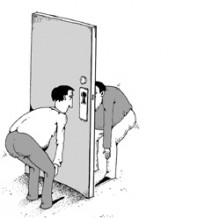I have been keeping in contact with representatives of the Ukrainian diaspora for the past 15 years. The initial feeling of detachment has long since disappeared. We correspond and meet every now and then as old friends. But the issues we discuss, sometimes polemical in content, result from the old misconceptions — after all we have been raised in different worlds — including their reactions to the “gray propaganda” (that being malevolent information about Ukraine and its people streaming through the world media and spreading by word of mouth). Skewing the facts has become a kind of hobby for some.
Allow me to cite one of the recent letters from overseas. Someone circulated a rumor that our president vetoed a bill on privileges for book publishers that was almost unanimously supported (with 400 ayes!) by the Verkhovna Rada. Note the underlying theme: a good VR sympathetic to the people’s needs and a bad president that is allegedly obstructing their efforts. Meanwhile, although the president, in fact, voted down this motion, I was alarmed by the negative responses of some publishers in their television appearances. The proposed privileges were to apply to all books published in Ukraine, irrespective of the language they are written in. Thus, professional publishers predicted that the law would cut publishing costs for not only Ukrainian books — which the lawmakers believed would open all doors for them — but of all the remaining books published in Chinese, Swahili, you name it.
Since the aim of any business is profit, then, in all probability, Ukrainian publishing houses will flood the market with even cheaper — considering lower transportation costs — Russian books published on orders from our “strategic partner.” With its largely bilingual population, Ukraine is a big market for Russian books. All of the above will make Russian book publishing even more profitable, while Ukrainians and Ukrainian culture will be left with the status quo. Therefore, the deputies would be better advised to dot their i’s and cross their t’s before the bill is signed into law. To this end, they have been given more time to revise the bill, for under any circumstances we should before all support all things Ukrainian.
Here is another rumor originating in Western Ukraine. Allegedly, orders came from the top to scale down the Petro Jacyk Ukrainian Language Contest. Indirect references were made to the Ministry for Education and Science. Incidentally, the contest received much publicity. Language enthusiasts were found not only in schools, but also in military academies and lyceums. And they were found not only in the West, but in the East and South, as well.
Through his personal connections, this author learned that no such orders were issued. Moreover, not only winners, but virtually all participants, let alone organizers, of the contest received prizes, among them watches and books with dedications. As evidenced by the contest, our young citizens are quite interested in the Ukrainian language. For them, the country where they were born is their one and only, regardless of the slogans from under red banners.
Lastly, there is the sensitive issue of a different Ukraine, a different people, dashed hopes and wasted efforts of the diaspora. It is time I quoted some abstracts from a letter dated January 2003.
“When, for a wonder, Ukraine got its independence, there were no Ukrainian leaders as such. There were only dispirited communists who did not know better than to turn into oligarchs, because they lost faith in communism and all they could do was line their pockets. There were, however, some genuine Ukrainian patriots. But they lacked the knowledge and experience to build a state. Granted, they tried, but to no avail. They were opposition leaders rather than state builders. Thus, control of the state was taken over by dispirited communists joined by Internationalists, and this combination, by virtue of the fact, took power in Ukraine.”
Let me pause for a moment. In hindsight, could events have taken a different course? If I am not mistaken, Vyacheslav Lypynsky predicted that the meltdown of the totalitarian system would be touched off by its leaders, because it takes an organized force to accomplish that. And where else, if not in the upper echelons of power, can such a force originate in a country where a company of three is classified as a conspiracy with all the resulting consequences? Thus it is obvious that, for want of democratic mechanisms stimulating processes of modernization in the society, curative processes normally get the better of the system, albeit at a stage when things seem to have gone too far. We experienced these processes firsthand.
Maybe some people from afar saw Ukraine green with cherry orchards and pastoral scenes under “whispering willows.” In reality, it proved to be a neglected and disregarded country, environmentally unsafe and polluted with radioactive emissions, and with an afflicted people.
I will continue my quotation: “The whole diaspora is dispirited and disappointed to have seen their funds, intended for the dear and fabled Ukraine, go into the pockets of oligarchs as if into a black hole in space.”
Granted, there were sincere, at times naХve, attempts to help Ukraine. But in our polity there is no party or organization that would sympathize with the cause of Ukraine and, therefore, use this aid for the right purposes. I also do not think that the so-called oligarchs lined their pockets embezzling diaspora funds, as there were plenty of other things to snatch. The national patriots, however, did not hesitate to make use of the funds with what they thought to be the best of intentions. They understood them as a payment due them for their “professional patriotism.”







